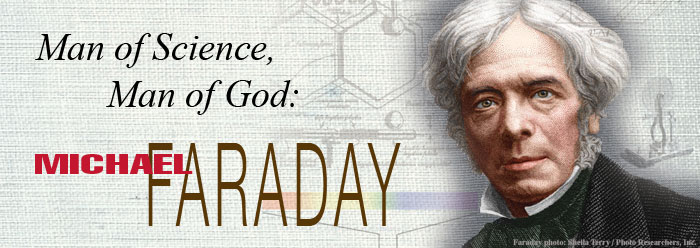Who: Michael Faraday
What: Father of Electromagnetism
When: September 22, 1791 - August 25, 1867
Where: South London, England
Michael Faraday was arguably the best experimentalist in the history of science. Apprenticed at age 14 to a local bookbinder and seller, he educated himself and developed an interest in science. He finished his apprenticeship in 1812 and attended lectures by renowned English chemist and physicist Humphry Davy (1778-1829) and John Tatum (1772-1858), founder of the City Philosophical Society. Faraday produced a 300-page book of notes from the lectures and sent it to Davy, who was impressed enough to employ him as a secretary and later as a chemical assistant at the Royal Institution.
Faraday, who was not considered a gentleman in the British class-based society, also served as Davy's valet on a long tour between 1813 and 1815. Made to travel outside the coach and eat with the servants, Faraday was miserable, but the trip allowed him access to the European scientific elite and he eventually was able to conduct his own research. In 1824, he became a member of the Royal Society and the following year was appointed director of the laboratory. In 1833, he was appointed to the Fullerian Professorship of Chemistry, a position he held until the end of his life.
Although Faraday made significant contributions in chemistry, including the discovery of benzene and the invention of an early version of the Bunsen burner, his most important work was in magnetism and electricity. In 1831, a series of experiments led to the discovery of electromagnetic induction. After demonstrating that a changing magnetic field produces an electric field, he used the principles to construct a device called the electric dynamo, the precursor of the modern power generator. In 1845, he discovered the phenomenon now called the Faraday effect, concerning the relationship of light and electromagnetism.
Faraday's mathematical abilities were elementary, but Scottish mathematician James Clerk Maxwell (1831-1879) later used Faraday's work to develop the equations that underlie all modern electromagnetic phenomena theories. In his scientific papers, Maxwell wrote, "The way in which Faraday made use of his idea… shews him to have been in reality a mathematician of a very high order--one from whom the mathematicians of the future may derive valuable and fertile methods."1
In 1832, he was granted an honorary doctor of civil law degree from the University of Oxford. Though he was highly respected, Faraday was a very humble man, rejecting a knighthood and twice refusing the presidency of the Royal Society. He was an active elder in his church throughout his life, and although Faraday considered religion and science to be "two distinct things,"2 he did not see them as conflicting with one another.
Yet even in earthly matters I believe that "the invisible things of Him from the creation of the world are clearly seen, being understood by the things that are made, even His eternal power and Godhead," and I have never seen anything incompatible between those things of man which can be known by the spirit of man which is within him, and those higher things concerning his future, which he cannot know by that spirit.3
Faraday refused an offer to be buried in Westminster Abbey but has a memorial plaque near Isaac Newton's tomb. When he died in 1867, he was interred in Highgate Cemetery and was later joined by his wife, Sarah Barnard, when she passed away in 1879.
Faraday's life and passion for science can best be summed up in his own words: "... I cannot doubt that a glorious discovery in natural knowledge, and the wisdom and power of God in the creation, is awaiting our age, and that we may not only hope to see it, but even be honoured to help in obtaining the victory over present ignorance and future knowledge."4
References
- Maxwell, J. 2003. The Scientific Papers of James Clerk Maxwell: Volume II. Mineola, NY: Dover Publications, 358-360.
- Jones, B. 1870. The Life and Letters of Faraday: Volume II. London: Longmans, Green and Co., 195-196.
- Ibid, 325-326.
- Ibid, 385.
*Ms. Dao is Assistant Editor.
Cite this article: Dao, C. 2008. Man of Science, Man of God: Michael Faraday. Acts & Facts. 37 (8): 8.













